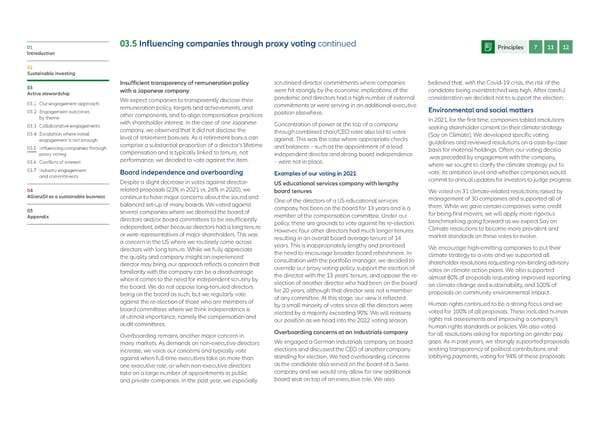01 03.5 Influencing companies through proxy voting continued Principles 7 11 12 Introduction 02 Sustainable investing Insufficient transparency of remuneration policy scrutinised director commitments where companies believed that, with the Covid-19 crisis, the risk of the 03 with a Japanese company were hit strongly by the economic implications of the candidate being overstretched was high. After careful Active stewardship pandemic and directors had a high number of external consideration we decided not to support the election. 03.1 Our engagement approach We expect companies to transparently disclose their commitments or were serving in an additional executive 03.2 Engagement outcomes remuneration policy, targets and achievements, and position elsewhere. Environmental and social matters by theme other components, and to align compensation practices In 2021, for the first time, companies tabled resolutions 03.3 Collaborative engagements with shareholder interest. In the case of one Japanese Concentration of power at the top of a company seeking shareholder consent on their climate strategy 03.4 E scalation where initial company, we observed that it did not disclose the through combined chair/CEO roles also led to votes (Say on Climate). We developed specific voting engagement is not enough level of retirement bonuses. As a retirement bonus can against. This was the case where appropriate checks guidelines and reviewed resolutions on a case-by-case 03.5 Influencing companies through comprise a substantial proportion of a director’s lifetime and balances – such as the appointment of a lead basis for material holdings. Often, our voting decisio proxy voting compensation and is typically linked to tenure, not independent director and strong board independence was preceded by engagement with the company, 03.6 Conflicts of interest performance, we decided to vote against the item. – were not in place. where we sought to clarify the climate strategy put to 03.7 Industry engagement Board independence and overboarding Examples of our voting in 2021 vote, its ambition level and whether companies would and commitments commit to annual updates for investors to judge progress. Despite a slight decrease in votes against director- US educational services company with lengthy 04 related proposals (23% in 2021 vs. 26% in 2020), we board tenures We voted on 31 climate-related resolutions raised by AllianzGI as a sustainable business continue to have major concerns about the sound and One of the directors of a US educational services management of 30 companies and supported all of balanced set-up of many boards. We voted against company has been on the board for 13 years and is a them. While we gave certain companies some credit 05 several companies where we deemed the board of member of the compensation committee. Under our for being first movers, we will apply more rigorous Appendix directors and/or board committees to be insufficiently benchmarking going forward as we expect Say on independent, either because directors had a long tenure policy, these are grounds to vote against his re-election. However, four other directors had much longer tenures Climate resolutions to become more prevalent and or were representatives of major shareholders. This was resulting in an overall board average tenure of 14 market standards on these votes to evolve. a concern in the US where we routinely come across years. This is inappropriately lengthy and prioritised directors with long tenure. While we fully appreciate We encourage high-emitting companies to put their the quality and company insight an experienced the need to encourage broader board refreshment. In climate strategy to a vote and we supported all director may bring, our approach reflects a concern that consultation with the portfolio manager, we decided to shareholder resolutions requesting non-binding advisory familiarity with the company can be a disadvantage override our proxy voting policy, support the election of votes on climate action plans. We also supported when it comes to the need for independent scrutiny by the director with the 13 years’ tenure, and oppose the re- almost 80% of proposals requesting improved reporting the board. We do not oppose long-tenured directors election of another director who had been on the board on climate change and sustainability, and 100% of being on the board as such, but we regularly vote for 20 years, although that director was not a member proposals on community environmental impact. against the re-election of those who are members of of any committee. At this stage, our view is reflected board committees where we think independence is by a small minority of votes since all the directors were Human rights continued to be a strong focus and we of utmost importance, namely the compensation and elected by a majority exceeding 90%. We will reassess voted for 100% of all proposals. These included human audit committees. our position as we head into the 2022 voting season. rights risk assessments and improving a company’s human rights standards or policies. We also voted Overboarding remains another major concern in Overboarding concerns at an industrials company for all resolutions asking for reporting on gender pay many markets. As demands on non-executive directors We engaged a German industrials company on board gaps. As in past years, we strongly supported proposals increase, we voice our concerns and typically vote elections and discussed the CEO of another company seeking transparency of political contributions and against when full-time executives take on more than standing for election. We had overboarding concerns lobbying payments, voting for 94% of these proposals. one executive role, or when non-executive directors as the candidate also served on the board of a Swiss take on a large number of appointments in public company and we would only allow for one additional and private companies. In the past year, we especially board seat on top of an executive role. We also
 Allianz GI Sustainability and Stewardship Report 2021 Page 56 Page 58
Allianz GI Sustainability and Stewardship Report 2021 Page 56 Page 58